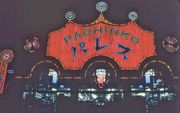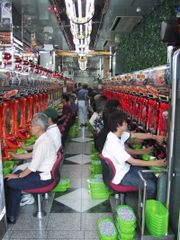 Pachinko parlor
Pachinko parlor
 Pachinko players
Pachinko players
 Entrance to large pachinko parlour in Shinsaibashi,
Osaka, Japan.
Entrance to large pachinko parlour in Shinsaibashi,
Osaka, Japan.
Pachinko (パチンコ) is a device used for amusment and prizes and is related to pinball machines. Although originally strictly mechanical, modern pachinko machines are a cross between a pinball machine and a video slot machine. Pachinko is said to have been invented sometime after World War II in Nagoya, though the date is sometimes questioned. The machines are widespread in Japan in establishments called "pachinko parlors", which also often feature a small number of slot machines.
The player purchases a large number of small steel balls which are inserted, in bulk, into the machine. Originally, machines had a spring-loaded lever for shooting the balls individually, but modern machines use a round "throttle" that merely controls how quickly an electrically fired plunger shoots the balls onto the playfield. The balls then drop through an array of pins, and usually simply fall through to the bottom, but occasionally fall into certain gates which make the machine pay out more balls.
Most current machines include a slot machine (these are called "pachi-slo"), and the big winnings are ultimately paid not from the balls falling into gates, but from the slot machine matches that follow. In fact, in many modern machines the balls have nothing to do with determining winnings, which are based strictly on electronic random number generators.
The winnings are in the form of more balls, which the player may either use to keep playing, or exchange for tokens or prizes such as pens or cigarette lighters. Under Japanese law, cash cannot be paid out, but there is virtually always a small exchange centre located nearby (or sometimes in a separate room from the game parlor itself) where players can conveniently exchange tokens or prizes for cash. Such pseudo-cash gambling is theoretically illegal, but from the sheer number of pachinko parlors in Japan, it is clear that the activity is at least tacitly tolerated by the authorities. (In fact, no pachinko parlor without a cash payout window has ever been documented.)
As a quasi-gambling activity, pachinko is widely held to have links to organized crime (specifically the yakuza). (There have also been rumors of links to the government of North Korea, which is thereby allegedly able to siphon funds from the sizeable population of Pyongyang-aligned ethnic Korean residents of Japan, but this seems an implausible and potentially racially motivated myth.)
Pachinko parlors share the reputation of slot machine dens and casinos the world over—garish decoration, over-the-top architecture, the smell of tobacco, the constant din of the machines, and players entranced for hours in their games.
External links
- Pachinko Machines
- Pachinko and Pachinko Parlors by Pachinko.com
- Modern Japan - Entertainment - Pachinko
- Pachinko - Japan's National Pastime
- Pachinko Machine Repair and Service
Categories: Slot machines




 216.73.216.133
216.73.216.133 User Stats:
User Stats:
 Today: 0
Today: 0 Yesterday: 0
Yesterday: 0 This Month: 0
This Month: 0 This Year: 0
This Year: 0 Total Users: 117
Total Users: 117 New Members:
New Members:
 216.73.xxx.xxx
216.73.xxx.xxx
 Server Time:
Server Time: